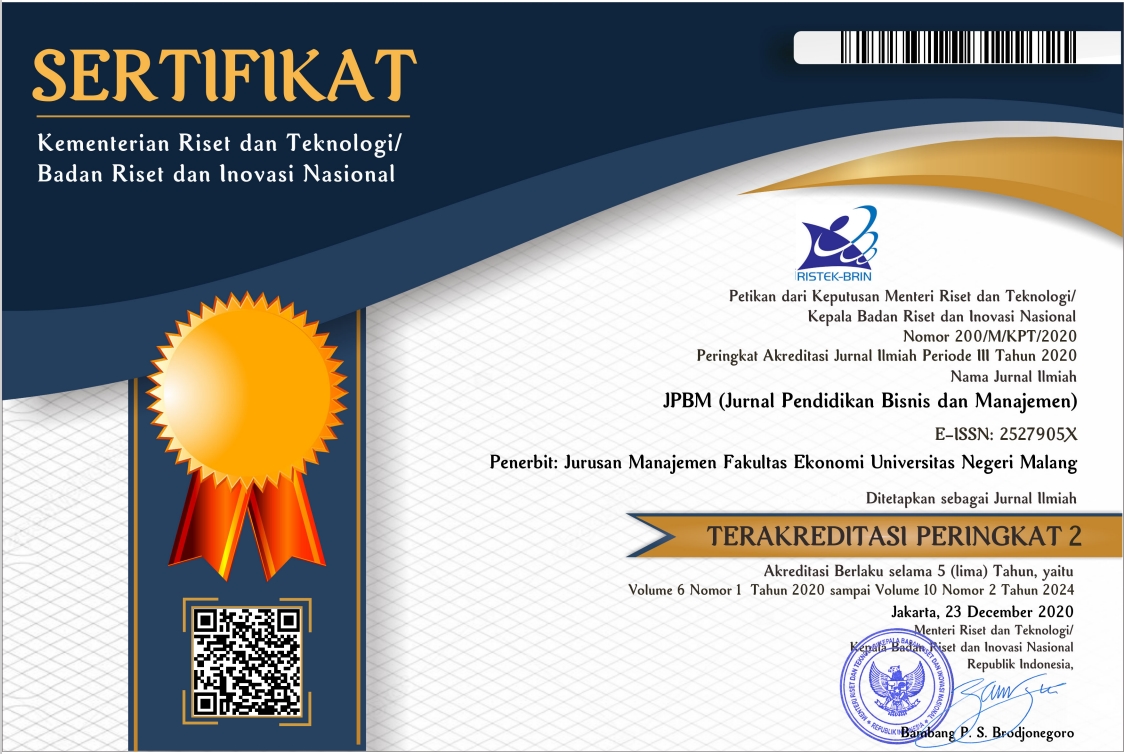Leadership Style and Interpersonal Communication of Employee Satisfaction and It’s Effect on The Employee Performance
Abstract
This study aims to determine the relationship between leadership style, interpersonal communication to employee job satisfaction and its effect on employee performance. The method used in this study is path analysis with SPSS application version 21. These results indicate that the relationship of leadership style on employee job satisfaction has a contribution of 0.24, while the relationship between leadership style on the performance of employees have a contribution of 0.279. In addition, the relationship between interpersonal communication on employee job satisfaction has a contribution of 0.131, whilst the relationship of interpersonal communication on the employee's performance has contributed of 0.448. The employee satisfaction relationship to employee performance has a contribution of 0.185. As for the total effect of leadership style through employee satisfaction on the performance of employees have a contribution of 0.323 and the total effect of interpersonal communication through employee satisfaction to employee performance has contributed 0.472.
Keywords
Full Text:
PDFReferences
Bel, B.R., Smirnov, V., Wait, A., 2018. Managing change: Communication, managerial style and change in organizations. Economic Modelling 69, 1–12. https://doi.org/10.1016/j.econmod.2017.09.001
Danzer, N., 2019. Job satisfaction and self-selection into the public or private sector: Evidence from a natural experiment. Labour Economics 57, 46–62. https://doi.org/10.1016/j.labeco.2019.01.002
Drzewiecka, M., Roczniewska, M., 2018. The relationship between perceived leadership styles and organisational constraints: An empirical study in Goleman’s typology. Revue Européenne de Psychologie Appliquée 68, 161–169. https://doi.org/10.1016/j.erap.2018.08.002
Farooqui, Ms.S., Nagendra, A., 2014. The Impact of Person Organization Fit on Job Satisfaction and Performance of the Employees. Procedia Economics and Finance, Shaping the Future of Business and Society 11, 122–129. https://doi.org/10.1016/S2212-5671(14)00182-8
Imboden, S., 2014. Chapter 36 - Effective Leadership, in: Motarjemi, Y., Lelieveld, H. (Eds.), Food Safety Management. Academic Press, San Diego, pp. 959–973. https://doi.org/10.1016/B978-0-12-381504-0.00036-6
Joo, M.-K., Yu, G.-C., Atwater, L., 2018. Formal leadership mentoring and motivation to lead in South Korea. Journal of Vocational Behavior 107, 310–326. https://doi.org/10.1016/j.jvb.2018.05.010
Parkhill, A., Deans, C.L., Chapin, L.A., 2018. Pre-leadership processes in leadership training for adolescents. Children and Youth Services Review 88, 375–379. https://doi.org/10.1016/j.childyouth.2018.03.033
Pobegaylov, O.A., Myasishchev, G.I., Gaybarian, O.E., 2016. Organization and Management Efficiency Assessment in the Aspect of Linguistic Communication and Professional Text. Procedia Engineering, 2nd International Conference on Industrial Engineering (ICIE-2016) 150, 2173–2177. https://doi.org/10.1016/j.proeng.2016.07.260
Sebastião, S.P., Zulato, G., Trindade, A.D., 2017. Internal communication and organisational culture: The management interplay in the view of the Portuguese communication consultant. Public Relations Review 43, 863–871. https://doi.org/10.1016/j.pubrev.2017.05.006
Sony, M., Mekoth, N., 2016. The relationship between emotional intelligence, frontline employee adaptability, job satisfaction and job performance. Journal of Retailing and Consumer Services 30, 20–32. https://doi.org/10.1016/j.jretconser.2015.12.003
Suhaimi, A.W., Marzuki, N.A., Mustaffa, C.S., 2014. The Relationship between Emotional Intelligence and Interpersonal Communication Skills in Disaster Management Context: A Proposed Framework. Procedia - Social and Behavioral Sciences, The International Conference on Communication and Media 2014 (i-COME’14) - Communication, Empowerment and Governance: The 21st Century Enigma 155, 110–114. https://doi.org/10.1016/j.sbspro.2014.10.265
Sylvester, K., 2016. Chapter 2 - Attributes of Effective Leader-Negotiators, in: Sylvester, K. (Ed.), Negotiating in the Leadership Zone. Academic Press, San Diego, pp. 11–22. https://doi.org/10.1016/B978-0-12-800340-4.00002-3
Yu, S., Ko, Y., 2017. Communication competency as a mediator in the self-leadership to job performance relationship. Collegian 24, 421–425. https://doi.org/10.1016/j.colegn.2016.09.002
DOI: http://dx.doi.org/10.17977/um003v4i32018p108
Refbacks
- There are currently no refbacks.
JPBM (Jurnal Pendidikan dan Bisnis Manajemen) is licensed under a Creative Commons Attribution-NonCommercial-ShareAlike 4.0 International License.
JPBM (Jurnal Pendidikan dan Bisnis Manajemen) is abstracted and indexed in :
















